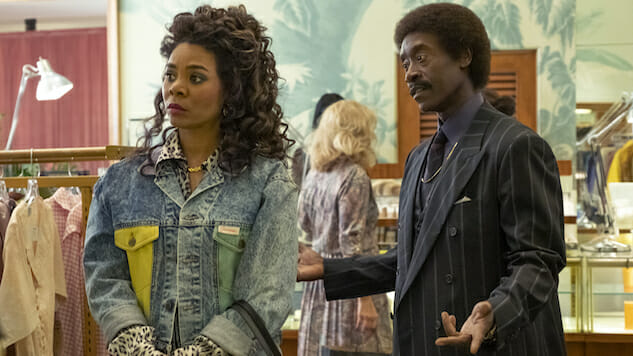Don Cheadle and Regina Hall Steal Showtime’s Wall Street Sitcom, Black Monday
Photo: Erin Simkin/SHOWTIME TV Reviews Black Monday
Yes, the world needed one more Wall Street comedy. Specifically, one not out to save that world. Because Black Monday isn’t here to point out hypocrisy. It’s here because it thinks trading shares in the 1980s with coke-vacuuming, trading floor-strutting superstar Maurice Monroe (Don Cheadle) is hilarious. The economic destruction coming Mo’s way, along with co-workers Dawn (Regina Hall) and Keith (Paul Scheer) and the meek-yet-volatile Blair (Andrew Rannells), a tech whiz who’s apparently cracked the Wall Street code, is simply the inevitable hangover at the end of the party. A crash is coming, and Black Monday knows its good time isn’t here for a long time.
With the real-life Black Monday, Oct. 19, 1987, still largely unexplained—all we know for sure about the biggest single-day drop in U.S. stock market history is that computerized trading likely played a role—there’s no need for the series to go all-out in its explanation. Simply amping up the greed and bacchanalia says enough. Making comedy out of speculative answers is a lot easier than making it out of the hard-and-fast causes of financial disaster. It’s not slapstick: You still have people talking about stocks and arbitrage and algorithms and illiquidity. But while its closest touchstones are The Wolf of Wall Street and The Big Short, and it features plot lines as stuffily housed as those in Succession, Black Monday is an intriguing entry in the genre of financial service satire because it’s a much sillier takedown of the country’s contrast-collar class.
Executive producers Seth Rogen and Evan Goldberg (who also directed the pilot episode) offer a unique spin on Adam McKay’s move towards upper-crust critique in their comedy, creating an unhinged tempo with handheld cameras and the overlapping jabberings of the cast. Driven by Cheadle’s energy—as unsafe as an experimental vehicle threatening to shake itself apart, with the hilarious Hall and Scheer bouncing one-liners like pebbles off his windshield—the show runs hot. It doesn’t always run well.
Aside from a few visual gags, like a coke-covered suit and a prank one could describe as “reminiscent of the director of the Golden Globe for Best Picture (Comedy or Musical),” speeches and montages dominate the series premiere, “365.” But with plenty of on-the-nose needle drops and reckless egalitarianism towards jokes, the show is dumbly likable compared to the harsh, flinty cynicism of higher-brow comedies focused on the same subject matter. The period setting allows big, brash goofiness to slide in alongside the hyper-specific trends of the era, à la Anchorman.
Cheadle thankfully ignites (but fails to destroy) the Apatowian “yes, and” ramblings that dribble off of a single punchline, making the comic second-guessing and ass-covering part of a scrupulously manic performance. There’s danger and self-destructiveness lurking in Mo, a great and fascinating character Cheadle imbues with some of the same unpredictability as his Miles Davis in Miles Ahead, because the same machismo that makes him a rock star is also a necessary survival mechanism when you’re black in the whitest industry in the world. It’s the same haughty testosterone that makes his delivery angrier (and funnier) as the jokes get weirder and more light—which they quickly do after the first episode.
But some things work from the start. Hall is given ample room to shine as the obvious standout she can and should always be. Her performance as Dawn is clever, exhausted, and full of the same restrained desperation dispensed by Cheadle, only doubled because she’s a competent black woman. That’s a lot to make up for on Wall Street. Supplementing her and Cheadle are a rotating bunch of guests—including Ken Marino pulling a James Franco/Armie Hammer-style twin performance as the fictional Lehmans heading Lehman Brothers—who keep the rambunctious, sitcom-y feel alive whenever the longer-running plot threads threaten to garrote the episodes. Rannells, however, and all his wonderful talents—acerbic barbs, cherubic go-get-em-ness, charismatic gestures that signal both warmth and depth—drowns in his role as a bland ingénue. Blair, seemingly browbeaten into unconsciousness, offers no deadpan response to his hopped-up scene partners, nor over-the-top revulsion at their excess and vulgarity. Instead, he just kind of sits there.
There are enough storylines planted in the opening episodes to promise plenty of opportunities for these characterization issues to even out as the season goes on. And this and the occasional burst of misplaced schmaltz only stand out as issues because Cheadle and Hall so confidently grasp their characters from their first seconds on screen; they’re instant icons. More layered jokes emerge as the group dynamic solidifies, as they should in a solid sitcom—which Black Monday is, even though its high-caliber cast and trendy subject matter may imply differently.
Black Monday premieres Sunday, Jan. 20 at 10 p.m.
Jacob Oller is a writer and film critic whose writing has appeared in The Guardian, Playboy, Roger Ebert, Film School Rejects, Chicagoist, Vague Visages, and other publications. He lives in Chicago, plays Dungeons and Dragons, and struggles not to kill his two cats daily. You can follow him on Twitter here: @jacoboller.